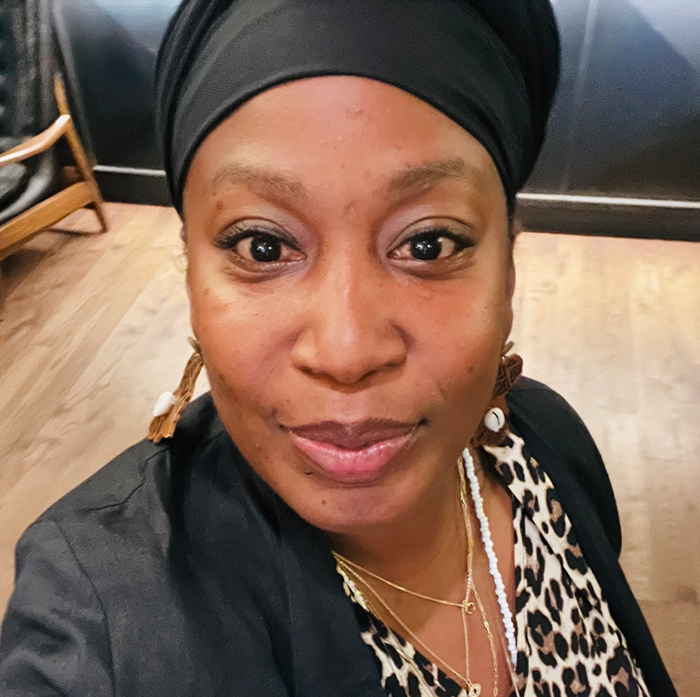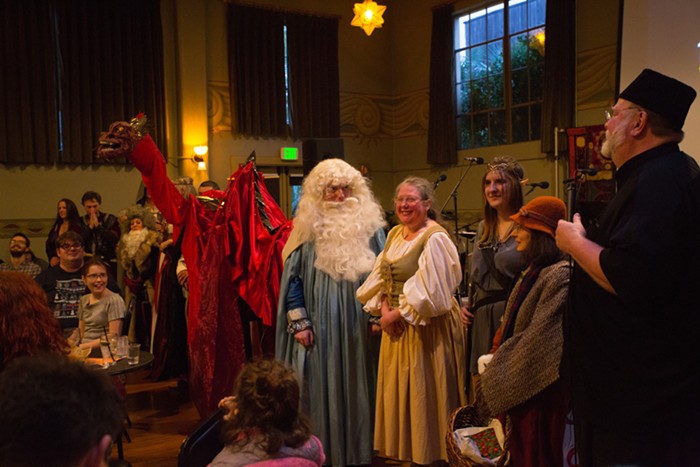IT'S NOT OFTEN in our modern world that we actually come face to face with what feeds us, but in 2003, outside of Auckland on a stretch of New Zealand highway, public relations executive Lisa Donoughe was confronted by what, and how, she'd been eating.
"I'd been eating lamb or venison three times a day for the first few days of my trip," Donoughe explains. "I was by myself in a rental car when I came across a truck of sheep on their way to be slaughtered." It was then that she locked eyes with a lamb.
"For whatever reason," Donoughe says, "There was this lingering moment where I was face to face with the choices I'd been making every day of my life eating meat, and it really got to me."
She made a decision at that moment to accept the responsibility of being a carnivore, and to own up to her part in the processing and consumption of animals like that slaughterhouse-bound lamb.
When she returned to Portland, she ran into friend and client Cory Schreiber of Wildwood restaurant. "I said to him, 'I'm really freaked out by this,'" she remembers. "I feel like if I eat an animal, I should have the courage to kill it, and I can't even kill a spider."
Puzzling over what she considers a bizarre relationship to her food, Donoughe began wondering if she could bring herself to kill her dinner. What should she start with? A bird? A fish? That's when Schreiber stepped in to offer a challenge.
"Cory said, 'If you kill it, I'll cook it,'" Donoughe says. Five years later the deal is still on the table. "I haven't had the guts. But one day...."
Though Donoughe, now director of Watershed Communications, hasn't brought herself to extinguish her own meal, she continues to be inspired by the difficult relationship between thoughtful, compassionate carnivores and the animals on which they feed.
She's particularly interested in the distance Americans have put between themselves and their food. Sure, that cow may represent what's for dinner, but what happens between the paddock and the bright, clean supermarket aisle remains a truth not sought by most people. For many, slaughterhouses are a place of terrible, brutal mystery, as are concentrated feeding operations, and even butcher counters: Meat comes individually wrapped in Styrofoam and plastic packages, and that's the way it should be.
Not according to Lisa Donoughe. She wants people to talk about their relationship to meat and all it entails—from raising to slaughtering, to butchering to eating. With that end in mind, Donoughe is working with former Portland Monthly food editor-turned-butcher Camas Davis to create a one-of-a-kind event to bring us up close to our meal and to probe the emotions surrounding it.
Called Livestock, in homage to Wordstock, the two-night event features live butchery demonstrations from local chefs concurrent with readings from featured authors and essayists about their relationship to meat. Livestock is as much performance art as it is a tool for raising awareness about our food. Seated in the kitchen of the Art Institute's International Culinary School, the audience will be confronted by the reality of professional butchery as well as the emotional reckoning that comes when thoughtful people consider the life and death of their food.
Davis is behind the literary aspect of the event. On her blog ladebrouillard.com she's been chronicling her own extraordinary adventures with meat, apprenticing with a family of French pig farmers and butchers after a stint as one of the area's more respected food editors (full disclosure: I was an intern at Portland Monthly during Davis' tenure).
"I grew up hunting and fishing and seeing blood and guts," says Davis, "so I'm used to that kind of stuff."
She says that as a child she was fascinated to watch her father dress a deer when he managed to shoot one. She continued to be interested in meat and meat production while working for Saveur magazine, where a story written by the food editor, Melissa Hamilton, about two old-school Italian butchers sparked a desire in Davis to pursue what was then a dying art. It wasn't until this year that the 33-year-old Davis was able to dive into the craft at a time when young butchers have become a sensation across the country.
Davis is also behind the Portland Meat Collective. The aim of the collective is to allow interested parties to get to know the farmer and the animal, as well as have a hand in the butchery and meat production. It's her way of bringing people closer to their food by connecting them directly to the producers.
"Obviously we're in a modern world," says Davis. "Not everyone has time to raise all their own animals or kill their own animals. But I do think that there is a kind of hypocrisy involved with being able to eat meat but not being able to think about the fact that your meat was killed."
In a way, the Livestock event is an attempt to help people come to terms with that fact. As curator of the literary portion of the event, Davis has been trying to make sure it's not simply a pep rally for the meat set.
"I'm trying to get writers to read who have some sort of ambivalent stance or anti-stance to meat eating," she says. "Obviously that could get messy, but hopefully it won't. Hopefully we'll all be respectful of each other and have a great conversation about it."
Still, the event is designed to be provocative. Surely watching Adam Sappington of Montavilla restaurant the Country Cat, or James Beard Foundation Award nominee Cathy Whims of Nostrana, break down an animal into its constituent parts might put some on edge. Especially while listening to emotionally charged stories about meat eating. So what happens if someone uses the event as a jumping off point into a life of veganism?
"The ultimate goal is mindfulness," says Donoughe. And veganism? "That's fantastic," she says. "That's a great mindful choice for them."
Livestock will take place at the International Culinary School at the Art Institute of Portland (34 NW 8th), November 4 and 11, at 6 pm. Both nights will include food prepared by the participating butcher, wine from local wineries, and a chance to speak with farmers who have raised the livestock being butchered. Tickets are $25 for each event. Call 827-6564 to reserve a seat.
***
ADAM SAPPINGTON of the Country Cat and Cathy Whims of Nostrana are two area chefs butchering and using the entire animal for service. While that might be great for diners, where do you go to find the best cuts for your own home cooking? Luckily, from the Eastside to the Westside, local butcher shops are providing well-prepared meats from locally raised livestock.
Chop Butchery and Charcuterie, 735 NW 21st, 221-3012
Occupying the City Market NW counter that was once home to Viande Meats and Sausage, Chop is continuing to serve the best cuts from local livestock. On top of that, Chop makes lovely charcuterie, meaning that you'll not only be able to purchase a great cut of meat, you'll also be able to get your hands on some amazing guanciale as well. Knowledgeable staff knows the producer as well as the animal, making sure all of your questions are answered. PAC
Gartner's Country Meat Market, 7450 NE Killingsworth, 252-7801
This year is Gartner's Country Meat Market's 50th anniversary, so it's no surprise that the Northeast staple has become something of a Portland institution. The family-owned butcher shop is as well known for its extensive collection of animal parts as its crowds of loyal customers who form lines there daily. The family-owned market sells pig, chicken, and cow in all variations, and will process elk, deer, and moose for those so inclined. DAVE BOW
Laurelhurst Market, 3155 E Burnside, 206-3099
Though it might be insanely busy as a thriving restaurant at night, by day the meat counter occupying the foyer of Laurelhurst Market is a mild-mannered destination for neighborhood foodies who need their specialty meat fix. Laurelhurst Market prides itself on the ability to get just about any exotic cut of meat with 24 hours' notice. It also prides itself on the variety of fantastic homemade cured products. Believe me, the country pâté cannot be beat. PAC



















